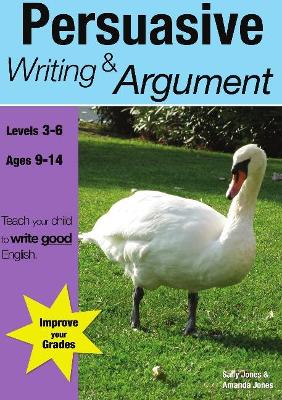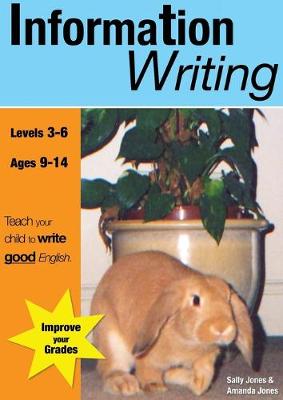Teach Your Child to Write Good English
2 primary works
Book 2
Learning Persuasive Writing and Argument is an essential guide for all students wanting to develop their literacy skills and improve their grades in English assignments and examinations.
Learning Persuasive Writing will enable the student to write convincingly in letters, leaflets, brochures and newspaper articles for example. The book also sets out how to write a well-balanced argument. It teaches the pupil how to structure their writing, putting forward a point of view, backing it up with convincing evidence, building up a relevant counter argument and knocking it down, as well as, putting forward their own comments and opinions. It focuses on discursive writing enabling the pupil to examine points for and against in a variety of subjects suitable for older children and teenage readers, healthy eating, fashion, social issues and many more. It includes a lively collection of writings, poems and a play to inspire the pupil. These are designed as starting points, ideal for the pupil who finds it difficult to think up ideas for writing, challenging them to recreate their own persuasive pieces.
In addition to this the book teaches organisational and literary devices in persuasive writing, including, figurative language, emotive words, repetition, connectives and use of good vocabulary. The student will learn how to consider writing for the appropriate audience, how to vary sentence types in order to make writing more interesting, and the importance of using good spelling,
punctuation and grammar. They will learn vital essay writing skills that will assist their studies in other areas of the curriculum.
Learning Persuasive Writing and Argument, includes an exciting range of model answers and sample texts written by children and provides practice questions to test them. Common errors made by students are highlighted and corrected. It is packed with vital hints and tips to enable the pupil to be successful and gain good grades.
Learning Persuasive Writing and Argument is ideal for home study and will reinforce the work done in school. It is a companion to the other books in our series, Creative Writing and Information Writing. By working methodically through this book the student will grow in confidence.
Learning Persuasive Writing and Argument has been written by an experienced teacher and tutor and written with the needs of children in mind. This book concentrates specifically and in depth on the art of persuasive writing and creating a good argument. These are key skills required by the National Curriculum up to GCSE level. It is specifically targeted at Key Stage 2 and 3 (ages 9-14 years) but will also be a valuable resource for those taking GCSE up to grades C and above. It contains material suitable for UK National Curriculum SATS, for those taking 11+ entrance examinations, for GCSE exams and for students learning English as a foreign language.
Learning Persuasive Writing will enable the student to write convincingly in letters, leaflets, brochures and newspaper articles for example. The book also sets out how to write a well-balanced argument. It teaches the pupil how to structure their writing, putting forward a point of view, backing it up with convincing evidence, building up a relevant counter argument and knocking it down, as well as, putting forward their own comments and opinions. It focuses on discursive writing enabling the pupil to examine points for and against in a variety of subjects suitable for older children and teenage readers, healthy eating, fashion, social issues and many more. It includes a lively collection of writings, poems and a play to inspire the pupil. These are designed as starting points, ideal for the pupil who finds it difficult to think up ideas for writing, challenging them to recreate their own persuasive pieces.
In addition to this the book teaches organisational and literary devices in persuasive writing, including, figurative language, emotive words, repetition, connectives and use of good vocabulary. The student will learn how to consider writing for the appropriate audience, how to vary sentence types in order to make writing more interesting, and the importance of using good spelling,
punctuation and grammar. They will learn vital essay writing skills that will assist their studies in other areas of the curriculum.
Learning Persuasive Writing and Argument, includes an exciting range of model answers and sample texts written by children and provides practice questions to test them. Common errors made by students are highlighted and corrected. It is packed with vital hints and tips to enable the pupil to be successful and gain good grades.
Learning Persuasive Writing and Argument is ideal for home study and will reinforce the work done in school. It is a companion to the other books in our series, Creative Writing and Information Writing. By working methodically through this book the student will grow in confidence.
Learning Persuasive Writing and Argument has been written by an experienced teacher and tutor and written with the needs of children in mind. This book concentrates specifically and in depth on the art of persuasive writing and creating a good argument. These are key skills required by the National Curriculum up to GCSE level. It is specifically targeted at Key Stage 2 and 3 (ages 9-14 years) but will also be a valuable resource for those taking GCSE up to grades C and above. It contains material suitable for UK National Curriculum SATS, for those taking 11+ entrance examinations, for GCSE exams and for students learning English as a foreign language.
Book 3
Information Writing is the essential guide for all students wanting to develop their literacy skills and improve their grades in English assignments and examinations.
This book concentrates specifically on information writing, as required by the National Curriculum and providing everything needed to stimulate a child to write. Information Writing teaches the child to recognise the difference between facts and opinions. It concentrates on different aspects of information writing including: writing to advise, writing to inform, writing to explain, writing to analyse, review and comment, giving examples. It teaches the child how a newspaper article is structured, how to write formal and informal letters, diaries, police reports, e-mails, biographies, autobiographies, interviews, book reviews and many more.
This book is designed as a starting point for writing, helping the child to form ideas, enabling him or her to structure their work and organise it into paragraphs. Attention is given to making writing more interesting by varying sentence types, using punctuation and good grammar.
Information Writing includes an exciting range of model answers and sample texts written by children and provides practice questions to test them. Common errors made by students are highlighted and corrected. It is packed with vital hints and tips on gaining those top grades. Information Writing is ideal for working through at home or as a resource in the classroom. By working methodically through this book the students will grow in confidence and will learn to enjoy writing.
Information Writing has been written by an experienced teacher and tutor with the needs of children in mind. It is specifically targeted at Key Stage 2 and 3 (ages 9-14 years), but will also be a valuable resource for those taking GCSE up to grades C and above. It contains material suitable for SATS examinations, for those taking 11+ entrance examinations and for students learning English as a foreign language.
This book concentrates specifically on information writing, as required by the National Curriculum and providing everything needed to stimulate a child to write. Information Writing teaches the child to recognise the difference between facts and opinions. It concentrates on different aspects of information writing including: writing to advise, writing to inform, writing to explain, writing to analyse, review and comment, giving examples. It teaches the child how a newspaper article is structured, how to write formal and informal letters, diaries, police reports, e-mails, biographies, autobiographies, interviews, book reviews and many more.
This book is designed as a starting point for writing, helping the child to form ideas, enabling him or her to structure their work and organise it into paragraphs. Attention is given to making writing more interesting by varying sentence types, using punctuation and good grammar.
Information Writing includes an exciting range of model answers and sample texts written by children and provides practice questions to test them. Common errors made by students are highlighted and corrected. It is packed with vital hints and tips on gaining those top grades. Information Writing is ideal for working through at home or as a resource in the classroom. By working methodically through this book the students will grow in confidence and will learn to enjoy writing.
Information Writing has been written by an experienced teacher and tutor with the needs of children in mind. It is specifically targeted at Key Stage 2 and 3 (ages 9-14 years), but will also be a valuable resource for those taking GCSE up to grades C and above. It contains material suitable for SATS examinations, for those taking 11+ entrance examinations and for students learning English as a foreign language.

